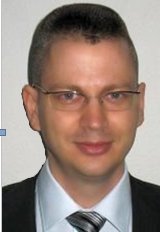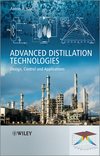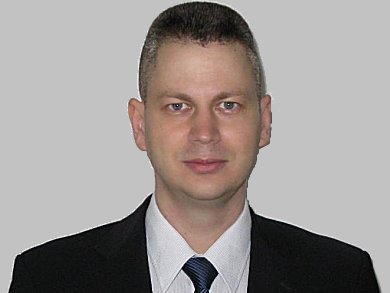Dr. Anton A. Kiss, Senior Project Leader, AkzoNobel – Research, Development, and Innovation, The Netherlands, and author of the book Advanced Distillation Technologies, talks to Alexandra Carrick for ChemViews Magazine about why separation technology, process intensification, and process systems engineering play a crucial role in making the chemical industry green, where future trends and challenges lie, and how he connects academia and industry.
As a high-school student you were a member of the National Chemistry Olympic Team of Romania. How did you get involved?
Chemistry was actually my first love, and I started this relationship at a quite young age. My passion for chemistry led to my participation at the National Chemistry Olympiads. Here I won several awards, and I was selected for the Chemistry Olympic Team.
Being in such a team, I enjoyed studying college-level chemistry already in high-school, and I particularly appreciated the interactions with the fellow colleagues from the other Olympic teams for physics, mathematics, and informatics.
Can you please describe how your career has developed?
I studied chemical engineering at ‘Babes-Bolyai’ University of Cluj-Napoca, Romania, where I received my B.Sc. and M.Sc. degrees, graduating as the best student. After a brief period of working as a teaching assistant at the same university, I moved to The Netherlands where I did my Ph.D. at the University of Amsterdam (UvA) on integrated design and control of chemical processes. Following the successful defense of my Ph.D., I joined Delft University of Technology, The Netherlands, as a post-doctoral fellow and also worked as a consultant for Unilever Research. Afterwards, I embarked on a PostDoc position at UvA, working on the development of solid acid catalysts and reactive distillation processes.
Since 2005, I have been working in applied research as Senior Project Leader at AkzoNobel acting as the principal expert in distillation and reactive separation processes. In addition, I enjoy giving invited lectures at universities and conferences, while also publishing scientific articles, book chapters, and textbooks.
How do you reconcile your roles as an invited lecturer at various universities and Senior Project Leader at AkzoNobel?
I really like being at the interface of industry and academia, and actually these roles create a win–win situation: The universities benefit from my industrial experience, while industry keeps up-to-date with the latest developments in academia. Being present in the academic environment, I can also scout for young talented people and attract them towards industry. These roles are especially useful in the public–private partnership projects I am involved in.
What kind of projects are these?
These are, for example, FP7 European and Institute for Sustainable Process Technology (ISPT) projects which promote an effective co-operation between the chemical industry, universities from Europe, and knowledge institutes.
Why did you choose to study chemical engineering?
Through my experiences with the Chemical Olympic Team I was very much attracted to chemistry. The decision to move from chemistry to chemical engineering was based on a good advice from my grandfather as well as to my inner desire to do something more practical, where the chemistry applications are interlinked to other science areas. On my quest to discover chemical engineering, I have had the pleasant surprise that it fits me extremely well, as it beautifully combines chemistry with engineering, mathematics, physics, computer sciences, and informatics, among others.
What are your areas of research, and why are they so interesting to you?
I am mainly active in the area of separation technology, process intensification, and process systems engineering. These key areas overlap and complement each other, while being interfaced with many other scientific areas. I strongly feel that these areas have a significant contribution towards making the chemical industry a green place, in an economical way: efficient use of raw-materials, zero waste production, sustainable processes and products, low investment and operating costs, and high safety.
Can you please give an example for this/be more specific?
Reactive distillation (RD) is one of the relevant examples in this respect, as it effectively provides process intensification in reactor and separation technology by using process systems engineering principles. Combining reaction and separation into a single operating unit, leads to increased conversion due to overcoming equilibrium limitations, high selectivity as the secondary reactions are minimized, low energy use as a benefit of in-situ heat integration, avoidance of potential hot spots, and ability to separate close boiling components. Moreover, less equipment with low holdup is required, thus contributing to low investment costs and also improved process safety.
Although a number of industrial applications of RD have been around for many decades, even today the crown example is the Eastman process that reportedly replaced a methyl acetate production plant of over ten operating units, with a single RD column using 80 % less energy at only 20 % of the investment costs.
How do you keep abreast of current trends?
Typically, I do this by reading scientific articles, reviews, books, blogs, and online magazines. Also, I find it essential to participate in scientific events, for example, conferences, symposia, and workshops in order to meet and discuss with top scientists from many other areas.
Getting good ideas from one scientific area to another is an excellent way to cross-fertilize ideas and create opportunities for innovation.
In addition, I pay attention to the feedback from students and more experienced colleagues in order to stimulate a useful dialog between generations.
What do you see as the future opportunities in your field of research?
There is clearly a large range of opportunities, but I will limit myself to just a few directions that are on my list of objectives:
- Improve energy efficiency,
for example, novel hybrid separations and reactive separations based on process intensification; separations powered by alternative energy sources like microwave, ultrasounds; waste heat recovery, - Address scarcity of materials and new feedstocks,
for example, CO2 carbon chemistry, biofuels production, biomass refining, biomass conversion technologies, process integration in biotechnology, novel separation methods, and recycling of scarce elements, and - Improve water valorization,
for example, wastewater treatment, process water removal, and energy efficient desalination technologies.
These opportunities will clearly require the development of new methods, tools, and processes based on separation technology, process intensification, and process systems engineering.
Where do you see the biggest challenges?
The biggest challenge worldwide is to significantly improve the quality of life for the ever growing population, while at the same time drastically reducing our footprint on this planet in a sustainable way. Let’s not forget that we did not get this planet from our parents, but rather loan it from our children. I am very confident that chemistry and chemical engineering will play an important role in overcoming the challenges that lie ahead.
You have written several books and many journal articles. What do you see as the importance of these publications?
The importance of these publications resides not only in the introduction, development, and description of novel hybrid processes and technologies, but very much also in stimulating others to search for better alternatives and creating awareness about the possibilities of using the latest advancements in the chemical process industry.
What other interests do you have besides your research areas?
I am also interested in computer science as a hobby, as well as reading literature, playing chess, watching high-ranked movies, and traveling to interesting places. In addition, I enjoy practicing various sports – especially swimming, biking, and tennis.
Thank you for the interview.
Anything in this interview represents the personal opinion of Dr. A. A. Kiss and is not necessarily the official position of AkzoNobel.

Anton A. Kiss studied chemical engineering at Babes-Bolyai University, Cluj-Napoca, Romania. He obtained a M.Sc. in chemical engineering from the same university, before moving to the University of Amsterdam (UvA), The Netherlands, where he obtained his Ph.D. under the guidance of Piet Iedema and Alexandre Dimian.
He then worked as a post-doctoral fellow at DeltChemTech, TU Delft, The Netherlands, with Johan Grievink and Sorin Bildea, and then again as PostDoc at UvA, working with Gadi Rothenberg.
Currently, Dr. Kiss is Senior Project Leader in separation technology at AkzoNobel Research, Development, and Innovation, Deventer, The Netherlands, where he is the key expert in distillation, reactive-separations, process intensification and integrated sustainable processes with ‘green’ attributes.
He has published several textbooks and more than 50 scientific articles in peer-reviewed journals.
- Homepage of Tony Kiss
Selected Awards
- Hoogewerff Jongerenprijs, The Hague, 2013
Prestigious Dutch award for the most promising young researcher - AkzoNobel Innovation Excellence Award, Amsterdam 2013
Research, Development & Innovation award for the most successful innovation
Selected Publications

Advanced Distillation Technologies – Design, Control and Applications
,
A. A. Kiss,
John Wiley & Sons, Hoboken, USA, 2013.
ISBN 978-1-1199-9361-2- Novel applications of dividing-wall column technology to biofuel production processes,
A. A. Kiss,
J. Chem. Technol. Biotechnol. 2013, 88, 1387–1404.
DOI: 10.1002/jctb.4108 - Towards energy efficient distillation technologies – Making the right choice,
A. A. Kiss, S. J. Flores Landaeta, C. A. Infante Ferreira,
Energy 2012, 47, 531–542.
DOI: 10.1016/j.energy.2012.09.038 - A review on biodiesel production by integrated reactive separation technologies,
A. A. Kiss, C. S. Bildea,
J. Chem. Technol. Biotechnol. 2012, 87, 861–879.
DOI: 10.1002/jctb.3785 - Reactive DWC leading the way to FAME and fortune,
A. A. Kiss, J. G. Segovia-Hernandez, C. S. Bildea, E. Y. Miranda-Galindo, S. Hernandez,
Fuel 2012, 95, 352–359.
DOI: 10.1016/j.fuel.2011.12.064 - Enhanced bioethanol dehydration by extractive & azeotropic distillation in dividing-wall columns,
A. A. Kiss, D. J.-P. C. Suszwalak,
Sep. Purif. Technol. 2012, 86, 70–78.
DOI: 10.1016/j.seppur.2011.10.022 - A control perspective on process intensification in dividing-wall columns,
A. A. Kiss, C. S. Bildea,
Chem. Eng. Process. 2011, 50, 281–292.
DOI: 10.1016/j.cep.2011.01.011 - Separative reactors for integrated production of bioethanol and biodiesel,
A. A. Kiss,
Comput. Chem. Eng. 2012, 34, 812–820.
DOI: 10.1016/j.compchemeng.2009.09.005 - Design and control of recycle systems by non-linear analysis,
A. A. Kiss, C. S. Bildea, A. C. Dimian,
Comput. Chem. Eng. 2007, 31, 601–611.
DOI: 10.1016/j.compchemeng.2006.09.002 - Solid acid catalysts for biodiesel production – Towards sustainable energy,
A. A. Kiss, A. C. Dimian, G. Rothenberg,
Adv. Synth. Catal. 2006, 348, 75–81.
DOI: 10.1002/adsc.200505160




